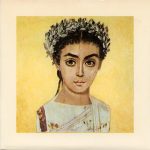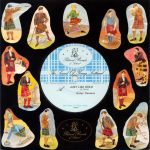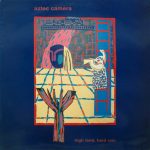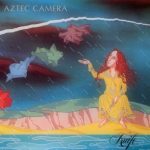Aztec Camera
Aztec Cameraは、スコットランドのグラスゴー近郊のイースト・キルブライド出身のロディ・フレイムを中心としたグループ。今までに6枚のアルバムを発表し、98年からはロディ・フレイムのソロ名義で3枚のアルバムを発表している。最新作はロディ・フレイム名義での”Western Skies”。
日本においては、ペイル・ファウンテンズや、オレンジ・ジュース、ブルー・ベルズ、エブリシング・バット・ザ・ガール等と共にネオ・アコースティック・サウンド(ネオアコ)の中心的核をなすグループと位置付けられており、ギターポップ的な指針を示した最も大切なグループの一つである。フリッパーズ・ギター等は彼らから多大な影響を受けたものとされている。
アズテック・カメラは当時17歳のロディ・フレイムが中心となり、スコットランドで結成された。その後グラスゴーのレーベルである「ポストカード」から「just like gold」をリリースした。 そして1983年、ラフトレードと契約した彼らはファーストアルバム「High Land Hard Rain」を発表した。 1984年、メジャーのWEAに移籍したアズテック・カメラは2作目の「knife」をリリースする。
その後は音楽性を少しずつ変えつつ、数枚のアルバムをリリースする。
1993年には『ドリームランド』を坂本龍一をプロデューサーに迎え発表する。これは坂本龍一のファンであったロディ・フレイムたっての依頼であった。
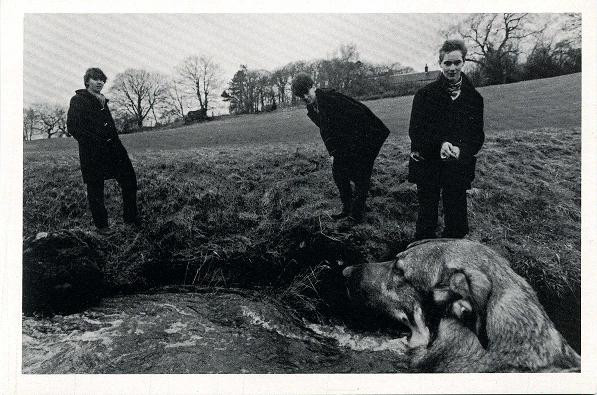
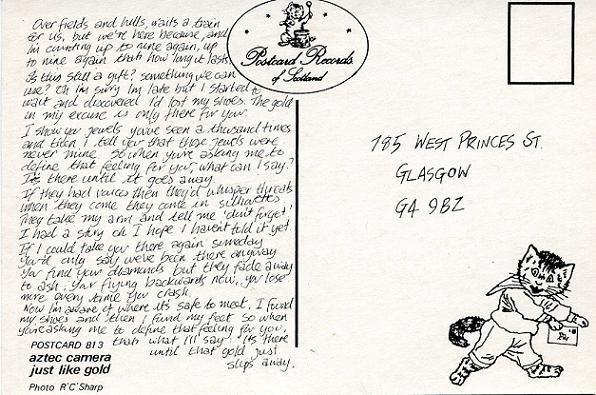
Aztec Camera were a Scottish pop/new wave band formed by Roddy Frame, the group’s singer, songwriter, and only consistent member. Formed in 1980, Aztec Camera released a total of six albums: High Land, Hard Rain (1983), Knife (1984), Love (1987), Stray (1990), Dreamland (1993) and Frestonia (1995). The band garnered popular success for the songs “Oblivious”, “Somewhere in My Heart” and “Good Morning Britain” (a duet with former The Clash guitarist Mick Jones).
Aztec Camera first appeared on a Glasgow cassette-only compilation of local unsigned bands on the Pungent Records label, affiliated with the Fumes Fanzine run by Danny Easson and John Gilhooly. Fumes and Pungent Records championed several Glasgow bands before they achieved popular success.
The band’s first United Kingdom (UK) single release was sold in a 7″ format by Postcard Records—a Glasgow-based independent record label cofounded by Edwyn Collins and Alan Horne—in 1981. The single featured the song “Mattress Of Wire” and a B-side entitled “Lost Outside The Tunnel”. Frame, aged 16 years, met Collins for the first time during the Postcard period when the latter was 21 years old.
A second single, also released in 1981, featured the songs “Just Like Gold” and “We Could Send Letters” — an acoustic version of the latter song appeared on a compilation album, entitled C81, that was released on cassette in 1981 through a partnership between NME magazine and Rough Trade Records. Following the two 7″ releases with Postcard, the group signed with Rough Trade Records in the UK and Sire Records in the United States (US) for their debut album. At this point, the band was officially a quartet: Roddy Frame (vocals, guitar, harmonica), Bernie Clark (piano, organ), Campbell Owens (bass) and Dave Ruffy (drums, percussion).
Aztec Camera’s debut album, High Land, Hard Rain was produced by John Brand and Bernie Clarke for the Rough Trade record label. The album was released in April 1983 and was distributed in different formats on Domino Recording Co. Ltd. in the US (in addition to Sire); WEA and Celluloid in France; Nuevos Medios, Nuevos Medios in Spain; Powderworks in Australia; MVM Records in Portugal; and WEA for a general European release. The album was successful, garnering significant critical acclaim, and peaked at number 129 on the Billboard 200. Frame later revealed that the song “Oblivious” was consciously written as a Top of the Pops-type pop song and received a corresponding degree of popularity.
During the recording process for the album, Frame used a different guitar for every song. For the song “Orchid Girl”, Frame explained in 2013—during the 30th anniversary tour—that he was attempting to merge the influences of his favorite guitarist at the time, Wes Montgomery, and punk rock icon Joe Strummer. In a late 1990s television interview, Frame explained that a “boy” image was associated with him during this era, and that he was annoyed by it at the time, as he was taking his music very seriously—”you don’t want to be called ‘boy’; especially when you’re listening to Joy Division”—but he eventually stopped caring about it.

